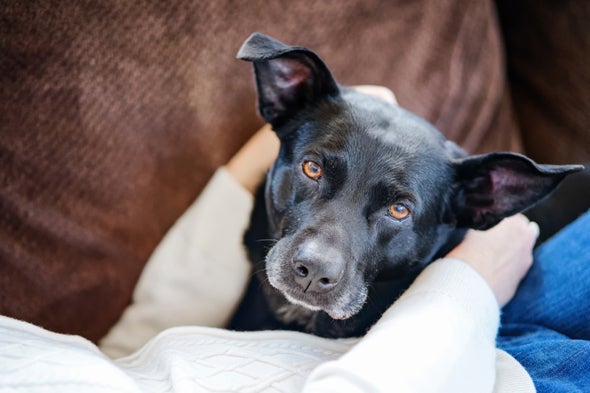Dogs or cats that live in a household with people who have COVID often become infected and sick themselves. Experts advise infected individuals to keep a distance from their animals if possible.
New research shows that people who become infected with the novel coronavirus, or SARS-CoV-2, and fall ill often pass the pathogen on to their pets. The animals sometimes also become sick from the infection, occasionally severely, according to the results of two separate studies presented at this year’s European Congress of Clinical Microbiology and Infectious Diseases. The papers have not yet been published in scientific journals.
A team led by veterinarian Dorothee Bienzle of the University of Guelph in Ontario investigated potential COVID infection in 198 cats and 54 dogs. All of the dogs and 48 of the cats came from a household in which at least one person had COVID, and the rest of the cats came from an animal shelter or neuter clinic. The team found that two out of three cats and two out of five dogs whose owners had COVID had antibodies against SARS-CoV-2, indicating they had been infected with the virus at some point, too. But in the shelter group, less than one in 10 cats had these antibodies. And in the neuter clinic, the figure was less than one in 38.
Dogs and cats that came from households in which owners had COVID also often developed symptoms of the disease, Bienzle and her team report. Between 20 and 30 percent of the animals experienced loss of energy and appetite, coughing, diarrhea, runny nose and respiratory problems. The complications were mostly mild and short-term, but they were severe in three cases. In cats, the risk of infection was higher in those that were closely cuddled by their owners, according to behavioral surveys the researchers conducted in addition to the antibody tests. This cuddling correlation was not observed in dogs.
Veterinarian Els Broens of Utrecht University in the Netherlands and her colleagues conducted similar studies on 156 dogs and 154 cats from about 200 households with human COVID patients. The researchers found that animals in one in five of these households had become infected with the virus—results identified by positive polymerase chain reaction (PCR) or antibody tests. Disease symptoms, especially respiratory and gastrointestinal complications, also occurred in the animals but were mostly mild.
Both Bienzle’s and Broens’s groups conclude that humans often transmit SARS-CoV-2 to their pets. “This is not at all surprising,” says Sarah Hamer, a veterinary epidemiologist at Texas A&M University, who is conducting similar studies on COVID-positive pets in the U.S. As research rolls in, she says, the international veterinary field is finding that pet owners transmitting the virus to their furry friends is more common than originally thought. “The findings are consistent: it’s just not that hard for these animals to get infected,” Hamer says. That result makes sense, she explains, given the closeness of person-pet relationships. “Often we’re snuggling and even sleeping in the same beds with them,” Hamer says.
The role pets and livestock play in the COVID pandemic has been debated for some time. Several studies have shown that pigs, cows, ducks and chickens seem to be largely resistant to the virus. Cats frequently become infected at higher rates than dogs, Hamer notes, and pass the pathogen on to fellow felines. Beyond the pathogen posing a risk to our pets’ health, researchers worry that it will multiply in the animals and possibly mutate, jumping back into humans at some point. “The main concern is ... the potential risk that pets could act as a reservoir of the virus and reintroduce it into the human population,” Broens says. Mink have been shown to retransmit SARS-CoV-2 to humans, leading some countries to take drastic measures to prevent the pathogen from spreading on mink farms. Denmark and the Netherlands culled their mink stocks, killing almost 20 million of the furry animals in total to stop the virus from spreading further.
So far, Broens says, there is no evidence of such retransmission from dogs and cats back into humans. But Hamer notes the current studies simply are not set up to answer that exact question. In the meantime, the researchers recommend pet owners exercise caution. “If you have COVID-19, my advice is to keep your distance from your pet and don’t let them into your bedroom,” Bienzle says. Hamer reiterates that the recommendations are the same as with any other humans in your household: if you’re infected, stay as far away as possible.
This article originally appeared in Spektrum der Wissenschaft and was reproduced with permission with additional reporting by Tess Joosse.

